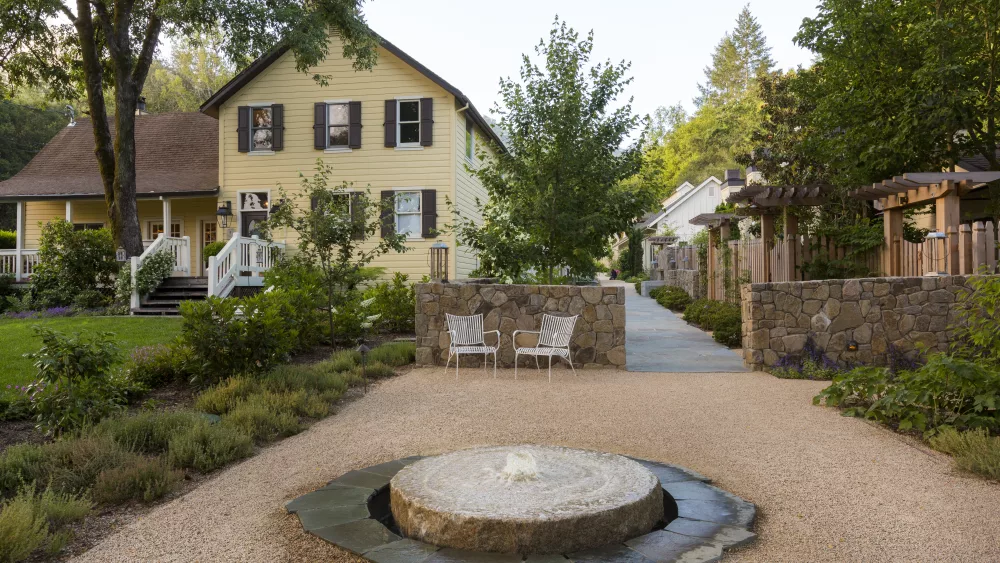
Something is up in Fairfax. The old line goes, “Fairfax is where hippies go to die.” If that’s true, the graveyard is full. Or maybe they’re still alive and battling “the man.”
Los Angeles-based Element 7 must also be wondering about its application to open a cannabis dispensary in Fairfax. At this writing, the town staff is preparing a formal rejection of the storefront that would take over the location of Mana Bowls Acai Café on Sir Francis Drake Blvd.
The application by Element 7 drew the wrath of 700 residents on a petition to the Town Council asking the elected officials to reject the application. After a lengthy hearing, the council voted 4-1 to continue the issue to another meeting, where the staff will have a rejection recommendation waiting.
Though concerns about the dispensary include public safety and traffic, Element 7’s main sin seems to be that it’s corporate. It has a trio of locations operating in California, with eight more scheduled to be opened, including a store in Napa. It entered an agreement last year with a large company in Southern California, Glass House Farms, to transfer 17 of Element’s cannabis licenses.
The Fairfax planning commission ruled last year Element 7 is a chain operation and required a chain conditional use permit. The cannabis company filed an appeal of the commission’s decision arguing it’s not a corporate chain.
With a future holding the hope of 11 dispensaries, if it walks like a duck, and talks like a duck, it’s likely a duck, even if the Mallard stocks fine edibles.
A pot shop being rejected because it’s too corporate. You can’t make this stuff up.
Fairfax has one pot shop, Marin Alliance CBC, the oldest cannabis shop in California. It famously weathered storms including federal shutdowns. Its roots put down by legalization pioneer Lynnette Shaw are strong, and she led the charge to keep Element 7 out.
Shaw is as focused as Donald Trump in the midst of a diet Coke and Big Mac binge. You don’t survive 19 years of battling the federal government without refining your determination and developing a skin thick as a brick.
Marin Alliance’s tenure in Fairfax has not been without drama, the Feds notwithstanding. Shaw and the Alliance have gone round and round with the town over a variety of issues.
While forming policy in Marin is known to move at a glacial pace, the ice seems to thaw in Fairfax even more slowly as Shaw and the Alliance have waited for the ability to deliver cannabis to adults on a recreational basis while the town council searched for the right course of action under a pot moratorium status.
An expectation of the Alliance welcoming Element 7 with open arms is as dumb as an episode of Keeping Up with the Kardashians.
And Element 7 has other issues beyond the Fairfax dust-up. Glass House is suing the company in Los Angeles Superior Court over its alleged failure to transfer all of the licenses agreed to in the February 2021 deal. Thus far only three of the licensed locations have moved from Element 7 ownership to Glass House. Glass House and Element 7 also had an agreement to develop future locations together, but Glass House canceled that deal last November.
The alleged failure of Element 7 to honor the deal should give Fairfax pause in that any agreement between the town and the company would be packed full of details and obligations that Element 7 would need to follow. History suggests that may not be a sure thing.
I’m familiar with Glass House from my work at The Deal. Glass House went public last year in a merger with Mercer Park Brand Acquisition Corp., a special purpose acquisition vehicle, and now trades in Canada under the ticker GLAS.
Should all of Element 7’s licenses transfer to Glass House, the company would be positioned as the largest grower/retailer in California, not a small thing in the world’s largest cannabis market. Glass House is positioned to have 23 dispensaries supplied by 6 million square feet of cannabis cultivation.
Last year, Glass House signed a $17 million agreement with Sonoma County’s Mosaic.Ag, an affiliate of Santa Rose Farms, to acquire four acres of outdoor cannabis cultivation facility. That deal is expected to close by the end of June.
Marin Alliance CBC is the only storefront outlet in Marin, despite medical marijuana being legal since 1996 and adult use pot’s legal status since November 2016. While Marin is widely regarded as a bastion of liberalism, the county is currently part of the 75% of California cities or counties that don’t have a cannabis storefront. Government bodies in Marin have struggled to formulate policy around how commercial cannabis can be grown and sold, despite 69% of the county residents voting in favor of adult use.
Bill Meagher is a contributing editor at this fine publication. He is also a senior reporter with The Deal, a Manhattan-based digital financial news outlet.




